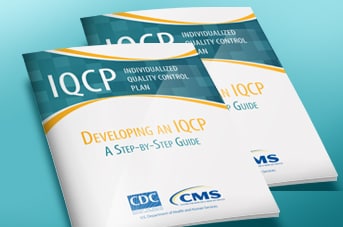Key points
- The Clinical Laboratory Improvement Amendments of 1988 (CLIA) regulations require a laboratory to have quality control (QC) procedures.
- The Individualized Quality Control Plan (IQCP) option offers the laboratory flexibility for meeting regulatory QC requirements.
- Learn how to develop an IQCP.

Overview
The CLIA regulations require a laboratory to have QC procedures to monitor the accuracy and precision of the complete testing process. A QC option now allows labs to customize an IQCP for their specific testing environment and patient needs. The IQCP option offers the laboratory flexibility for meeting regulatory QC requirements appropriate for the testing performed.
IQCP is an all-inclusive approach to assuring quality. It includes practices already used by laboratories to ensure quality testing, beyond just testing QC materials at a set frequency. IQCP applies to all nonwaived testing performed, including existing and new test systems. All CLIA specialties and subspecialties except Pathology are eligible for IQCP.
Guide
The Developing an IQCP - A Step-By-Step Guide workbook assists in developing an IQCP for one or more test systems. The workbook uses an example scenario to guide development of a sustained and modified IQCP over time through a step-by-step process. You will evaluate your current quality activities and develop an IQCP worksheet which, when completed, can serve as your IQCP document. The approach outlined in this workbook is one example for documentation; it is not mandatory or the only format available.
More information
For questions, or comments, please e-mail: LabExcellence@cms.hhs.gov
